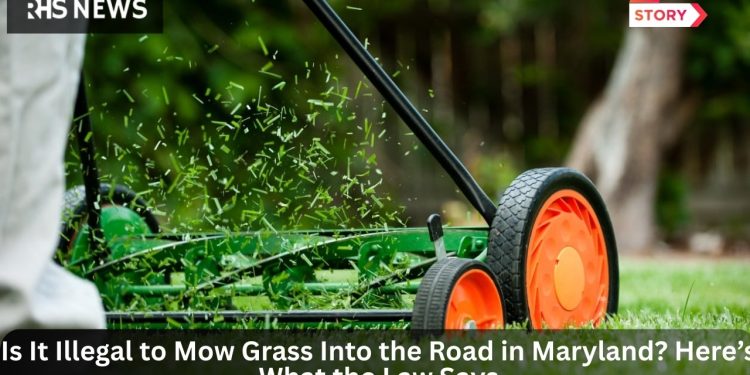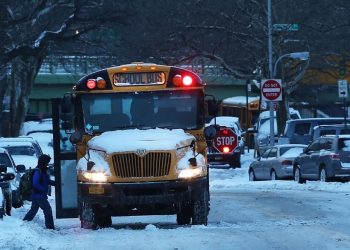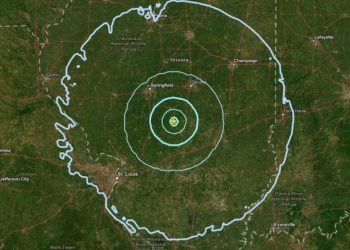Every weekend across Maryland, homeowners fire up their lawnmowers to maintain their properties, but many remain unaware of a seemingly simple practice that could land them in legal trouble: mowing grass clippings directly into roadways. While it might appear harmless to blow clippings onto the street during routine yard maintenance, Maryland law takes a surprisingly firm stance on this common practice.
What Maryland Law Actually Says
This Article Includes
- 1 What Maryland Law Actually Says
- 2 Understanding the Violation: More Than Just Aesthetics
- 3 Potential Legal Consequences and Penalties
- 4 County-Specific Variations and Local Ordinances
- 5 Best Practices for Legal Compliance
- 6 Enforcement Realities and Practical Considerations
- 7 Frequently Asked Questions (FAQ)
- 7.1 Q: Is it really illegal to blow grass clippings into the street while mowing?
- 7.2 Q: What happens if I accidentally get some grass clippings on the road?
- 7.3 Q: How much is the fine for mowing grass into the road in Maryland?
- 7.4 Q: Will I get in trouble if my landscaping company blows clippings into the street?
- 7.5 Q: What should I do if I receive a citation for grass clippings?
- 7.6 Q: Are mulching mowers really a good solution?
- 7.7 Q: Can I put grass clippings in storm drains?
- 7.8 Q: Does this law apply to private roads or just public streets?
- 7.9 Q: What if my neighbor reports me for grass clippings?
- 7.10 Q: Can I be sued if someone gets hurt because of my grass clippings?
- 7.11 Q: Are there any exceptions to this law?
- 7.12 Q: How do code enforcement officers typically find violations?
- 7.13 Q: What’s the best way to dispose of grass clippings legally?
- 7.14 Q: Do I need to clean up clippings that blow onto the road naturally?
- 7.15 Q: Does this apply to leaves and other yard debris too?
- 7.16 Q: How long do I have to clean up if I get a violation notice?
- 8 The Bottom Line
Maryland’s position on mowing grass into roadways is governed by several intersecting statutes and regulations. The primary legal authority comes from Maryland Transportation Code § 21-1103, which prohibits placing or depositing any material on roadways that could create hazardous conditions for motorists.
Additionally, Maryland Code, Environment Article § 9-228 addresses littering and dumping violations, which can encompass organic materials like grass clippings when they’re deliberately placed on public property. These statutes work in conjunction with local municipal ordinances that often provide more specific guidance on lawn maintenance practices.
The Maryland Department of Transportation (MDOT) has consistently interpreted these laws to include grass clippings, fallen leaves, and other organic debris when property owners intentionally deposit them on state or local roadways.
Understanding the Violation: More Than Just Aesthetics
The legal prohibition against mowing grass into roads isn’t merely about maintaining clean streets—it addresses genuine safety and environmental concerns that lawmakers have deemed worthy of enforcement action.
Safety Hazards: Fresh grass clippings create slippery conditions, particularly dangerous for motorcyclists and cyclists. When wet, these organic materials can cause vehicles to lose traction, leading to accidents. The Maryland Department of Transportation has documented numerous incidents where grass clippings contributed to roadway accidents.
Storm Drain Complications: Grass clippings that enter storm drainage systems can cause significant blockages, leading to flooding during heavy rainfall. This creates both immediate hazards and long-term infrastructure damage that taxpayers ultimately fund through remediation efforts.
Environmental Impact: While grass clippings are biodegradable, their concentration in waterways through storm drains can contribute to nutrient pollution, affecting Maryland’s already challenged Chesapeake Bay ecosystem.
Potential Legal Consequences and Penalties
Violating Maryland’s prohibition against depositing grass clippings on roadways can result in several types of penalties, depending on the specific circumstances and local jurisdiction.
Fines and Citations: First-time offenders typically face fines ranging from $50 to $200, though amounts vary by county and municipality. Montgomery County, for example, imposes fines up to $150 for initial violations, while Baltimore County’s penalties can reach $100 for similar infractions.
Enhanced Penalties: Repeat offenders or cases involving larger quantities of debris may face escalated fines up to $500 or more. Some jurisdictions treat multiple violations as evidence of willful disregard for public safety regulations.
Civil Liability: Property owners could face civil liability if grass clippings they deposited contribute to traffic accidents. Maryland follows contributory negligence principles, meaning even partial responsibility for hazardous conditions could result in significant financial exposure.
Code Enforcement Actions: Local code enforcement agencies may issue violation notices requiring immediate remediation, with daily fines accruing until compliance is achieved.
County-Specific Variations and Local Ordinances
While state law provides the overarching framework, Maryland’s counties and municipalities have developed their own specific regulations that property owners must navigate.
Montgomery County maintains particularly strict enforcement through Code Compliance inspectors who actively patrol neighborhoods during peak mowing season. The county’s ordinances specifically prohibit “depositing grass clippings, leaves, or other organic matter on any roadway or storm drain.”
Anne Arundel County has implemented an educational approach combined with enforcement, requiring property owners to remove clippings within 24 hours of notification or face escalating fines.
Baltimore City treats grass clipping violations as part of broader cleanliness ordinances, with penalties integrated into existing code enforcement mechanisms.
Rural counties often have less aggressive enforcement but maintain the same legal prohibitions, typically responding to complaints rather than conducting proactive patrols.
Best Practices for Legal Compliance
Property owners can easily avoid legal issues by adopting proper grass clipping management practices that comply with Maryland law while maintaining attractive landscapes.
Mulching Mowers: Using mulching mowers that cut clippings into small pieces and distribute them back onto the lawn eliminates the disposal issue entirely while providing natural fertilization.
Bagging Systems: Collecting clippings in bags for composting or municipal yard waste programs ensures complete compliance with dumping prohibitions.
Strategic Mowing Patterns: When using side-discharge mowers, directing clippings toward the interior of the property rather than toward roadways prevents violations while maintaining efficient mowing practices.
Timing Considerations: Avoiding mowing immediately before anticipated rainfall prevents wet clippings from creating hazardous conditions even when properly managed.
Enforcement Realities and Practical Considerations
While the law clearly prohibits mowing grass into roadways, enforcement varies significantly across Maryland’s diverse jurisdictions. Urban and suburban areas with dedicated code enforcement staff tend to have more consistent monitoring and citation practices, while rural areas often rely on complaint-driven enforcement.
Many violations result from property owners simply being unaware of the legal requirements rather than willful disregard. Educational outreach programs in several counties have proven more effective than purely punitive approaches in achieving compliance.
Property owners should also consider that homeowners’ associations may have their own restrictions that exceed state and local requirements, creating additional compliance obligations.
Frequently Asked Questions (FAQ)
Q: Is it really illegal to blow grass clippings into the street while mowing?
A: Yes, it is illegal in Maryland under state transportation and environmental codes. Maryland Transportation Code § 21-1103 prohibits placing materials on roadways that create hazardous conditions, and grass clippings fall under this prohibition.
Q: What happens if I accidentally get some grass clippings on the road?
A: Accidental clippings that scatter onto the roadway during normal mowing typically won’t result in citations. The law targets intentional depositing of clippings. However, if you notice clippings on the road after mowing, it’s best practice to sweep or blow them back onto your property.
Q: How much is the fine for mowing grass into the road in Maryland?
A: Fines vary by jurisdiction but typically range from $50-$200 for first-time offenders. Montgomery County fines up to $150, while Baltimore County penalties can reach $100. Repeat offenders may face fines up to $500 or more.
Q: Will I get in trouble if my landscaping company blows clippings into the street?
A: As the property owner, you remain responsible for violations even when using a landscaping service. Ensure your contractor understands local regulations and uses compliant disposal methods. You could still receive citations and fines for your contractor’s violations.
Q: What should I do if I receive a citation for grass clippings?
A: Contact your local code enforcement office immediately to understand the specific violation and timeline for compliance. Most jurisdictions allow you to contest citations through administrative hearings. Remove any remaining clippings promptly to avoid additional daily fines.
Q: Are mulching mowers really a good solution?
A: Yes, mulching mowers are excellent for legal compliance. They chop clippings into small pieces that decompose quickly on your lawn, eliminating disposal issues while providing natural fertilization. This completely avoids the roadway dumping problem.
Q: Can I put grass clippings in storm drains?
A: Absolutely not. Depositing grass clippings in storm drains is strictly prohibited and can result in more severe penalties. Storm drains lead directly to waterways, and clippings cause blockages and environmental damage.
Q: Does this law apply to private roads or just public streets?
A: The law primarily applies to public roadways maintained by state or local governments. Private roads may have different rules established by property owners or homeowners associations, but it’s still advisable to avoid depositing clippings on any roadway.
Q: What if my neighbor reports me for grass clippings?
A: Neighbor complaints are a common source of enforcement actions. Code enforcement officers will typically investigate and may issue warnings or citations. It’s better to maintain good neighbor relations by following proper clipping disposal practices.
Q: Can I be sued if someone gets hurt because of my grass clippings?
A: Yes, you could face civil liability if grass clippings you deposited contribute to accidents. Maryland’s contributory negligence laws mean even partial responsibility for hazardous conditions could result in significant financial exposure beyond criminal fines.
Q: Are there any exceptions to this law?
A: There are no general exceptions for homeowners. The law applies equally to all property owners. Some jurisdictions may have different enforcement priorities, but the legal prohibition remains constant across Maryland.
Q: How do code enforcement officers typically find violations?
A: Enforcement varies by jurisdiction. Some areas have proactive patrols during mowing season, while others respond primarily to citizen complaints. Urban and suburban areas tend to have more active enforcement than rural counties.
Q: What’s the best way to dispose of grass clippings legally?
A: The best options include: using mulching mowers, bagging clippings for municipal yard waste collection, composting on your property, or using clippings as mulch in garden beds. All methods keep clippings on private property.
Q: Do I need to clean up clippings that blow onto the road naturally?
A: While you’re not typically cited for naturally windblown clippings, it’s good practice to clean them up when noticed. This demonstrates good faith compliance and helps maintain neighborhood safety and aesthetics.
Q: Does this apply to leaves and other yard debris too?
A: Yes, Maryland’s laws generally apply to all organic debris including leaves, small branches, and other yard waste. The same legal principles and safety concerns apply to any material deposited on roadways.
Q: How long do I have to clean up if I get a violation notice?
A: Timeline varies by jurisdiction but typically ranges from 24-72 hours. Some counties like Anne Arundel give 24 hours, while others may allow up to a week. Check your specific violation notice for exact requirements and contact code enforcement if you need clarification.
The Bottom Line
The answer to whether it’s illegal to mow grass into roads in Maryland is unequivocally yes. State law, supported by local ordinances throughout Maryland’s jurisdictions, explicitly prohibits depositing grass clippings on roadways.
This prohibition reflects legitimate public safety concerns, environmental protection goals, and infrastructure preservation needs that extend far beyond simple aesthetics. The potential consequences—including fines, civil liability, and contribution to serious accidents—make compliance both a legal requirement and an ethical responsibility.
For Maryland property owners, the solution is straightforward: adopt proper grass clipping management practices that keep organic debris on private property where it belongs. Whether through mulching, bagging, or strategic mowing techniques, maintaining a beautiful lawn while respecting public safety and environmental concerns is entirely achievable within the bounds of Maryland law.
Understanding and following these regulations protects not only individual property owners from legal consequences but also contributes to safer roadways and healthier communities throughout the Old Line State.









